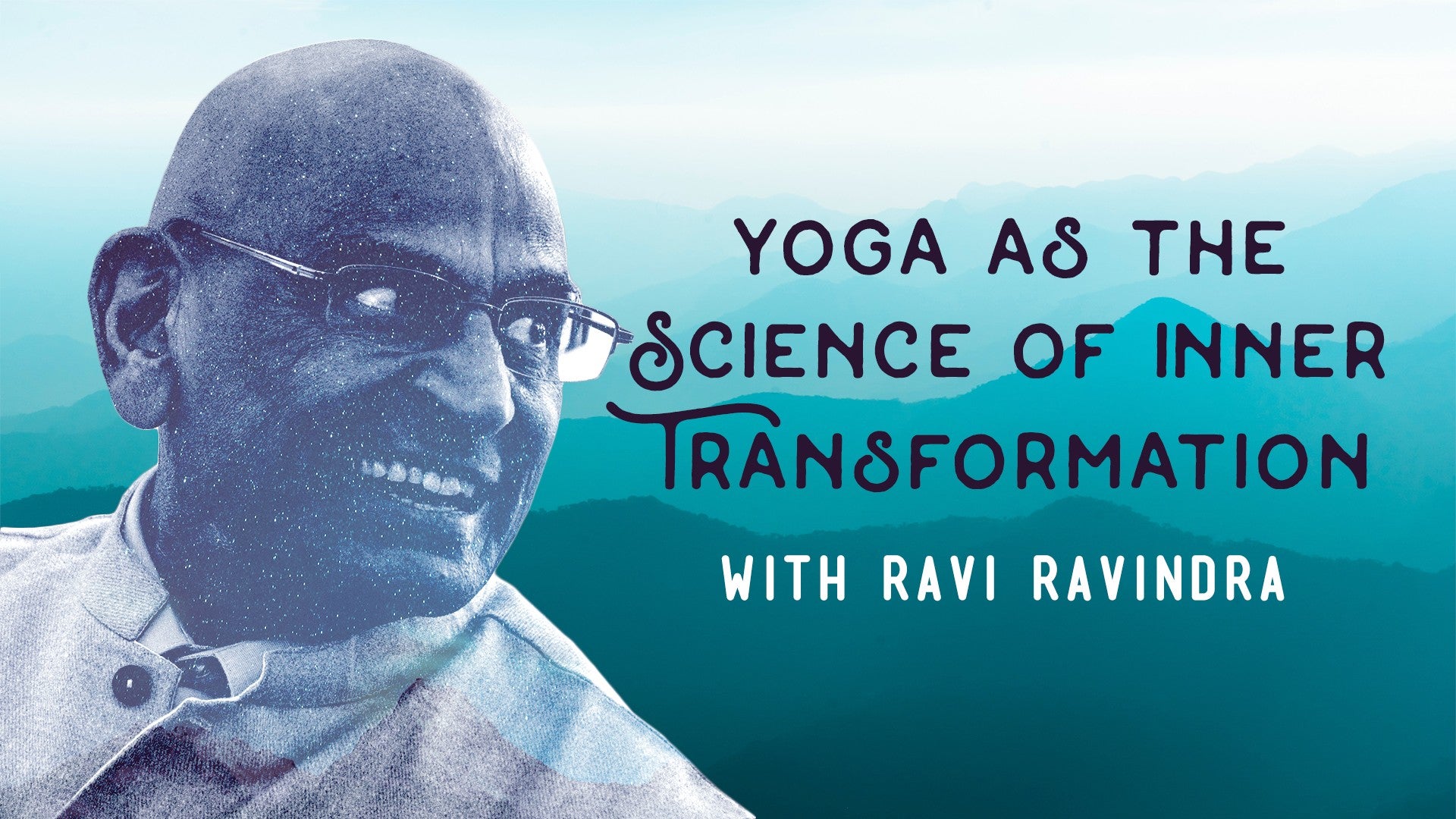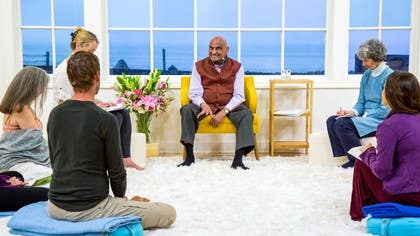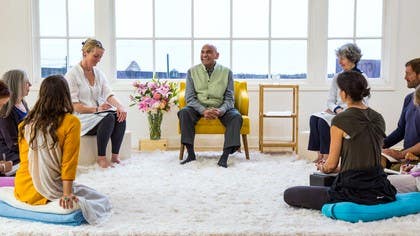Description
About This Video
Transcript
Read Full Transcript
Chapter 1
We begin our meditation this morning by a reminder that a heart is able to receive some intimations of the mystery much more quickly, willingly and deeply than the mind can. So to connect with some of our feelings, first of all to take a few moments to be free of the usual emotions, anxiety, worry, what do I have to do later, what did I forget to do, all that kind of occupation. And that is assisted, one can be a little free of this if I just pay a little bit of an attention of what is going on inside me right now, and then a reminder from really very great sages, in this particular case the scientist Pascal, that heart has reasons that reason does not know. So to connect with a slightly subtler feeling, not the level of anxiety or worry or jealousy, the easiest one for most of us, even beginning artificially, is a sense of gratitude. We can begin by a sense of gratitude to our own parents naturally, without them we could hardly be alive or be here.But from the perspective of all the spiritual teachings, even the parents do not create themselves by themselves. So one gradually begins to have some sense of gratitude for these subtle energies pervading the whole cosmos which have brought me here. And for almost each one of us, there is always some particular situation in our life or a particular person for whom we feel a great deal of gratitude for some special happening. So to recall that, not getting into a lot of free association about it, but more importantly to watch an enhancement of this feeling of gratitude, eventually for the very fact that I am alive. And it's quite natural for us that a sense of gratitude evokes some kind of an obligation.
While I am staying and wishing to keep returning, if necessary, to this feeling and the implied obligation, it's quite natural that the ordinary mind wanders away. So I connect it with my breathing in and breathing out, without artificially changing my breathing or holding my breath outside or inside. It actually helps if I can be a little aware of the movement of my abdomen up and down, naturally corresponding to breathing in and breathing out. But this is only as it were on the side, to keep my mind here, returning if necessary or staying with the feeling of gratitude for my existence and the implied obligation. How do I, in my life, my activities, my relationships, correspond to why these forces have created me?
And each one of us needs to watch the way this sense of obligation manifests, but traditionally the sages would say again and again that that obligation manifests in terms of closer and closer relationship with the other's sense of compassion, sense of love. Keep watching the feelings, do they deepen or become stronger, become weaker, not how it should be, but how it is with me? How do I, how do I, how do I, how do I? How do I, how do I, how do I? How do I, how do I, how do I?
How do I, how do I? How do I, how do I? Now, internally, and if I find it helpful, even externally, I can use these words without speaking too loudly, but more importantly to watch the corresponding feeling, I am blessed to be alive and wish to relate with anyone I encounter with a sense of compassion, care. How do I, how do I, how do I? How do I, how do I?
How do I, how do I, how do I? Now, each one of us say umm three times without necessarily trying to coordinate with each other. I simply make my contribution to this overall sound and watching where does it evoke any kind of feeling in me. How do I, how do I, how do I, how do I? How do I, how do I, how do I?
Thank you very much.
Chapter 2
But continuing a little bit from yesterday about self-knowledge or self-inquiry, Swadhyaya, there really is a double matrix depending on what is the level of the self that is doing the looking and what is the level of the self that is being looked at. For example, I can be wholly occupied with myself totally selfish and then I say oh look how wonderful I am, I can do this, I can do that. So there's also self-observation or one can also feel that I am not quite corresponding to what I vaguely hear the divine will, then one ends up, we can see this in many, many teachings, Lord have mercy. In both cases it's really self-knowledge in a way.So keep this in mind, it's really a double matrix, the level or the quality of the self that is doing the looking and the level that it is interested in looking at. So much can go on in the name of self-knowledge. So be a little careful always questioning. This is always a helpful reminder if Christ were here or the Buddha were here looking at themselves more and more deeply, almost certainly their quality will be different. Therefore it is not that we know exactly what they would see but it's always a reminder that there are many levels.
This is something which is always necessary to keep reminding oneself that I am not at the end of the journey. And in fact this is something very strongly recommended by all the great sages that sooner or later one actually almost forgets about the destination. It's the journey that becomes the interesting part. And then en route one sometimes sees the lovely landscape and one can even wait there and see and enjoy and relish but remembering that the journey continues. So in any understanding or any teaching never to put a closure on it and not to conclude but to remain open that I would see something quite remarkable.
As a young man occasionally going particularly in the Himalayas one begins from the foothills and you see a very high peak and you are almost convinced my goodness if I at the end of the day after several hours of hard work you get to the top suddenly then you see the other peaks until that time you didn't see the other peaks and you seem like the highest peak you're ever going to see. So actually only when you come to a certain level you begin to see that you just started. Always a good reminder there is hardly ever a great scientist who have ever existed who stop doing research. So keep this in mind self knowledge is an endless journey. Ultimately in fact many great sages say this is a remark of in fact in the Bhagavad Gita also Aristotle spoke about that long time ago that ultimately the self with the capital S knows itself that all the other is just part of the journey.
And then another thing which I also in passing mentioned the other day but just a reminder that there are two fairly common consequences of seriously looking at oneself because one sees all kinds of failures or demons as the Buddha would say and that it can lead to despair also it can lead to fantasy I am the son of God or I am Brahman etc. This is where the greatest help at least in my own experience as well as reflection is a community of fellow searchers. Community doesn't have to be very large depends even two three four people will do. In fact if it is more than it doesn't it's not easy to have any serious conversation. So that is the range of a serious community of searchers.
And this has always been the case for example I am sure specially emphasized in the Buddhist literature taking refuge in the Buddha in Dharma and in Sangha. Sangha means the community of searchers. Then there is another thing to be emphasized that self knowledge or self perception and self transformation are not two things especially when it comes to the kind of knowledge we are speaking about in the spiritual realm. If this knowledge does not make any difference in my life then it's not worthwhile knowledge. This is very important to understand because we have become completely removed from that whether you know we have a great law in physics E is equal to MC square which means energy is equal to mass multiplied by the square of the velocity of light.
It could be MC cube or MC four it's not going to make any difference in my life. It's a very important thing to understand the kind of knowing or perception or inquiry that the spiritual teachings are talking about that what I can know or see will change the person who is seeing it which is why self transformation which is what is required and self perception or self knowledge are not two things it's really like a spiral. This is very important also to appreciate it's not that I completely know myself then I am transformed or that I am completely transformed then I know myself no this is even in a very ordinary way if I am let us say interested in chemistry so then naturally I'm drawn to reading something more about chemistry and then it can increase my interest in chemistry. So it's not that I'm wholly knowledgeable about chemistry therefore I become interested in chemistry it's no development of any kind especially the spiritual realm is linear but our language creates a linearity for example the eight limbs of yoga there is no suggestion that you must be completely a holy master of yam niyam and asana before you can come to meditation no there is but when you are making a list there is one two three four so the language creates a linearity experience is not linear so keep this in mind about self knowledge as well that one knows something and then one finds a little shift in oneself then of course in the extreme cases this is I'm just quoting to you a very famous remark from Tantra called Gandharvatantra only who is divine can know the divine or Mundo Kupanishad this is great Upanishad says those who know Brahma become Brahma there's always this is ultimately only the like can know the like come back to that remark of St. Paul that I mentioned two or three days ago eyes of the flesh see the things of the flesh eyes of the spirit the things of the spirit only when my eyes of the spirit or at whatever level level of closer and closer to divinity that I come internally then I can perceive divinity in other people actually only then I can in fact acknowledge that the divine is pervading the whole cosmos until that time is it's a good idea but it's not resulting from my perception if one is internally connected more and more with a higher level then it is easier to see the higher level in other people in my own experience I should say that I really am very blessed I have met some very remarkable people in any case I am no longer likely to meet people closer to the Buddha and Christ than the ones I have met they may exist but if I'm an old man it's unlikely that I'll meet them and what was remarkable about these people that I have met they they were not completely stuck at the seeing the surface of myself they could see something much deeper in me than I even myself see in fact on one occasion I remember saying to Krishna Murthy we were just going for a walk I actually said I said Krishna ji it seems to me you see more deeply what is inside me than I do why don't you just tell me it'll save me some time see one is always trying to get some advantage and he said he'd never denied that he could actually see but he said sir that will be like reading your private mail it's interesting but the point I'm really more making is that clearer is one's own self-awareness or self-knowledge the word knowledge don't take it like our usual scientific knowledge it's really closer to direct perception closer one is to that in oneself easier it is for them to see in other people their depth which is the reason why actually sometimes we visit people and we are touched by them because we feel as if we have been seen not judged it's a very interesting thing something is seen but they're not judging us they also see we have our surface so it's a very different kind of perception so come back to this because one of the reasons I'm now mentioning it I won't dwell on this right now but maybe in a day or so in the Bhagavad Gita the major yoga that Krishna teaches which hardly anybody seems to remark on is actually buddhi yoga literally meaning the yoga of awareness because that is the whole yoga that can then bring about a transformation awareness is the let me actually say this even dogmatically awareness is the only mechanism of transformation let me actually make a few more remarks about it if I see something in me deeply it can arouse conscience if I am not corresponding to something which I wish to correspond to and then it can therefore demand the corresponding action from me otherwise we are always relying on somebody else to transform me to change I actually this may not be time for us to reflect on it right now but I invite you to consider yourself what other mechanism you can think of of transformation to take a very simple example this by the way has now actually become even accepted in standard science now whatever we observe changes in its quality now I'm making a slightly more general remark here that whatever I become aware of changes in its quality and in its relationship with me simplest example is I am breathing all the time like everybody else in general I am not aware of my breathing if I become aware of my breathing the quality of my breathing will change and therefore it will have a different relationship with my organism you can try this which is the little bit more complex any human being you meet maybe your own brother sister child father mother if you pay attention the word awareness as I said yesterday also is intimately connected with two or three other words becoming conscious becoming paying attention this is how we become aware of something so if you pay attention to a kid watch you'll be surprised the relationship of the kid towards you will change anything else in fact an experiment that I have often suggested to people nobody has ever denied it take two plants as close to each other that you can possibly manage and put them at same kind of amount of sunshine same amount of rain etc etc or water same kind of food that you can possibly manage and one plant you just leave it there give it the food and pay no attention to it the other plant for the next two weeks every day go and spend about five minutes stand in front of it paying attention to that plant with affection I guarantee in two weeks you will see the two plants growing completely differently if the plants can respond you can imagine other human beings responding our own so I actually am saying this very strongly that the only mechanism of transformation that at least I know of course is first of all just to complete the sentence the only mechanism of transformation is awareness theoretically we have some examples in human history where for example we have in the gospel Christ places his hand on a person who is unable to walk now he can walk so here is the transformation but now this is the situation very few people are about the same level as Christ so we don't need to fantasize it is possible that somebody who is so extraordinary can essentially really by their touch or by their look can bring an enormous amount of energy in somebody it is their awareness which is bringing about the change it is still awareness which is bringing the transformation but not of the person himself necessarily that somebody else is because we have examples like this in all spiritual literature would have great miraculous powers of people being healed by the touch of somebody or well the gospel is you know a person blind person opens his eyes person who is unable to walk stands up and walk but that is being brought by some very extraordinary person Christ own awareness so that's possible but still awareness is the mechanism of transformation I'm inviting you so to look at yourself more and more impartially and deeper and deeper usually what happens I see something in me if I like it right away I want to proclaim it if I don't like it I want to change it and I'm suggesting to you don't bother about changing it or proclaiming it just watch steadily more and more impartially if you like I can give you a theoretical reason for that awareness belongs to a level of consciousness higher than the functions thinking moving these are the functions and if I stay in the state of awareness at that time I'm connected with a higher level so then that higher level energy can actually change something at a lower level but if I come right down to the same level I want to change it or I want to announce it then I'm at the same level where the problem is in fact Einstein even made this remark well he was talking about physics problems but it psychologically also applied he said a problem cannot be solved at the same level at which it originates so for this to change I need to be connected with a level which is a little higher than where the problem is so awareness is the mechanism of transformation and therefore all this emphasis on self study there are several words that get used in English self-study self-inquiry self-observation self-knowledge you see it's difficult to pin it down since what's what I actually covers all of these so then I suggest to you that it is more important that I see than what I see the reason for that is that we need to cultivate the quality of perception sometimes we may say quality of the seer remember your yoga students seer is in the direction of Purusha what is seen is the direction of Prakriti first of all it is endless you can see endless numbers of things not only about yourself about everything else everybody else so this I know we get either fascinated by what we see or we resent what we see we want to change it but I am suggesting to you it is more important that I see than what I see and that what I need to do is to find ways of strengthening the seeing which is another way of saying strengthening the seer connecting with the fear and that does require I am afraid shutting this mind which is always eager to reform everybody including oneself a little quiet meaning of that that allows as Patanjali says then the seer you know after saying yoga chitta briti niroda and then he said the next very next sutra is tatrudh rishtva svarupayavastan then the seer can reside in its true form so it's not an easy undertaking but you see the rationale behind it that it is more important to see than what I see so I intentionally wanted to take some of this time to really more elaborate the whole nature of Swadhyay or self-study self-seeing partly because it is absolutely at the heart of any serious spiritual practice yesterday I quoted to you from the Gospel of Thomas so this is not only an Indian thing this is not only in yoga it's everywhere in the case the Vipassana I mentioned to you Vipassana literally comes from the Sanskrit world of Vipassana to see that's the whole Vipassana meditation is basically exactly on that then let us look quickly what does there is a bit of a shift from the first chapter in the yoga sutra to the second chapter in the first chapter Patanjali says yoga is stopping the movements of the mind in the second chapter there is a slightly more positive statement this is the second sutra in the second chapter that yoga is for the purpose of cultivating samadhi and for diminishing the kleshas these two Sanskrit words samadhi and klesha will take a few moments to speak about it because Patanjali says this is the purpose of yoga and for which he suggested these three activities which we already spoke about namely tapas, swadhaya and ishwar pranadhan so I won't speak about them anymore but samadhi and klesha what is samadhi actually the third sutra in the third chapter Patanjali describes or defines what is samadhi samadhi is the state in which the self is not literally the Sanskrit expression is svarupushunya I am not the self is not the literal meaning of this recall what I mentioned the other day this is from the gospel of methiu unless you leave yourself behind you cannot be a follower of mind you can see what is yoga's purpose this complete transformation which is why I keep reminding people sure yoga is good for your health and it maybe even increase increases your sexual powers or whatever but that's not the main purpose of yoga it's a whole transformation that is the issue and so samadhi is then second part of definition there is let me actually quote it exactly samadhi is the state where self is not and whatever object is seen in meditation only the object remains now remember some time ago I had said that spiritual search is for a knowledge which is completely objective but that is obtained by almost completely removing the subject rationally it doesn't make much sense but it is almost saying seeing without the seer that I am not seeing it but I become an instrument through which seeing is taking place you see the difference in the two and you can read any of the great sages who actually often end up making remarks like this Hafiz for example who was the teacher of Rumi makes this remark that I have become now an empty read through which Christ can play his own breath this is teacher of Rumi to become an instrument rather than the actor rather than the doer so in a way rationally it's really almost like seeing I'm seeing but I'm not the seer seeing without the seer or knowing without the knower if you like it's better actually to begin to use the word seeing because knowing still keeps bringing us always to standard kind of knowledge but the kind of knowledge that the spiritual teachings are talking about is actually a direct perception as I mentioned three or four words in Sanskrit which are used for this so keeping this in mind the suggestion that samadhi is the state in which I'm completely free of myself so then whenever I look at can reveal itself completely another image that Patanjali uses earlier actually in the first chapter that the mind can then become like a completely clear diamond whatever it looks at it allows the object to reveal its own color without introducing the diamonds color that's lovely imagery but every great teacher has to find some way of describing something but they almost always end up saying it really can't be described or that is like describing colors to a blind man etc they have varieties of ways of saying this but still they wish to convey something so this is I think a very interesting so the yoga is for the purpose of cultivating samadhi seems like a simple idea by the way I should also warn you here these days the word samadhi in the ordinary cultural background has become as if you get into a trance that's a very different understanding of samadhi that's not what Patanjali's yoga sutra is saying and exactly you can read it's the third sutra in the third chapter then for diminishing the cliches that is obviously required because to come to a state of samadhi there are many hindrances state of samadhi is the state of wakefulness it's one might say how do I come to that state then there are many hindrances the word clisha can be translated as an obstacle as a resistance or as a hindrance more or less all of these translations will be appropriate so many things stand in the way but Patanjali repeats this a vidya is the source of all of this a vidya meaning ignorance that that is the main source of all of these other cliches but he then specifically speaks about three or four and we'll take a few minutes to speak about them but a vidya in a way I have already already spoken a little bit about literally means ignorance in the Bhagavad Gita the word which is much more frequently used is agyan which is also means ignorance and that is from the perspective of all the sages in India at least that I am I have ever encountered in their writings or anything they would all say that the chief source of all our problems is a vidya ignorance and primarily ignorance of what I am or who I am Patanjali in fact himself describes a vidya exactly like that to take the transient for the eternal unpleasant for the pleasant and non-self for the self that is a vidya then almost the first product of a vidya is a smita literally means I am this or I am that and very strong suggestion that I isolate myself from the whole reservoir of being and identify myself with this or that it's the wholeness that one needs to be connected with classical way of saying that I remind you in India the as I said the beach pressure of the fundamental question is co co hum who am I and the response to that by the great sages anybody can repeat these words that's not the important thing but does it come from the truth from the actual experience so the response to that is so hum I am now it's also useful for me to relate this with the biblical traditions here partly given most people here having background that is literally what the word Yahweh means I am Moses again if you're interested I invite you to read this is book of Exodus actually chapter 3 if you're interested in the first time this word is used Yahweh in the Bible is 3 verse 14 third chapter Exodus Moses as you know is running away from the law he has killed an Egyptian soldier and if he's found he'll be arrested likely killed so he's actually running away from the law almost like a criminal and he runs into a farmer falls in love with the farmer's daughter and he's doing for me and this is where he sees the burning bush and then he hears by the way I actually very much recommended Priscilla and I went to this great monastery called Saint Catherine's monastery this is the oldest monastery still in the same form meaning lightning or fire has not destroyed it it's really the only monastery that has survived for so long and it has more extraordinary works of art in it I often think it'll be billions of dollars worth in the open market here the cover of my book the yoga of the Christ is actually one of the paintings from there we intentionally chose that and extraordinarily I highly recommend that this is in Egypt so you begin there you see the burning burning bushes in the monastery and in the morning then you can go up to Mount Sinai it's not easy it takes several hours she ended up with riding a camel I went most of the time on foot in any case there so he hears this voice go tell the Pharaoh to let my people go now here is a person running away from the law he says who should I say has sent me this is the first time the word Yahweh is used go tell the Pharaoh that Yahweh has sent me which literally means I am but then usually in most European or Indo-European languages they keep adding a word like I am who I am has sent me but literally it simply means I am and I hear quickly just make one remark all the great enunciations of Christ such as I am the way the truth and the life literally should be understood as I am is the way the truth and the life they personalize it as if he's being very egocentric that's not what he's saying literally the word Jesus itself comes from the Hebrew word Yahshua which means Yahweh saves that's the literal meaning even his name means exactly that people just make it all very personalized in any case coming back to this so I am is the enunciation as a response to what I am or who I am but Asmita doesn't say I am it says I am this or I am that you see the limitation of the I'm using just the language to convey that that's the distinction that if I isolate myself from the wholeness that isolated self is in its nature isolating it's not only separated it separates everybody and then partly the survival mechanism I need to keep protecting this I therefore it requires it creates fear because it will be destroyed it will be taken over but I need to protect it so ambition so fear and desire actually result from this isolation which is what much of the Indian tradition especially in Buddhism but even in the Bhagavad Gita that what is mostly driving the world is fear and desire or fear and ambition sometimes it's translated so Asmita is the very first product of ignorance then Patanjali actually doesn't go into great details of many of these things but then he speaks about to rag and dvesh usually these are coupled together and they are usually translated as like dislike that that's the other difficulty just here to remind you first of all it is said in the Buddhist tradition that the Buddha never did anything that he liked I don't believe this means that he disliked everything he did much more importantly that this had no relevance one does what needs to be done whether I like it or I don't like it no parent undertakes the care of their children or not because they don't like it or they like it has nothing to do with this then Patanjali actually makes a rather very interesting comment that a rag is arises from attachment to pleasure we wish to repeat it and dvesh arises from attachment to displeasure or suffering now here it is worth spending a few moments at least attachment to pleasures make some sense but ironically we are more attached to suffering than to happiness this may seem very weird but we are all very weird in fact you can watch this in fact this is my I'm going to give you this as a homework which I can mention right now think of an experience which could be created by somebody or had somehow a reason which created some suffering for you does it still stay in your psyche or in your body and how do you respond to this similarly think of a moment of pleasure which one do you find is deeper residing certainly in my own experience I can tell you very simply often maybe after a public talk or somebody says oh that was wonderful someone is happy but half an hour later I have no idea who this person was but if somebody says this was such completely stupid it was a dumb talk I'm afraid I remember that a little longer it actually hasn't really happened yet but but I can imagine that but you see what I'm saying in fact very serious teacher for example Guruji actually makes this remark a person will give up anything but will not give up his suffering nations can get attached to suffering if they have lost a war that stays more deeply in their psyche then if they have won a war so much so that Krishna in the Bhagavad Gita has many ways of defining or describing yoga and one of the description of yoga is and I'm now quoting from the Bhagavad Gita is by the way the sixth chapter twenty third shloka in the Bhagavad Gita yoga is breaking the bond with suffering so you see how deep this whole idea is that we get so much attached to our suffering breaking the bond with suffering Krishna says is yoga but take these teachings or these scriptures or great texts the yoga sutra is not considered a scripture in India but it will be regarded as a great text that they are not to be easily dismissed they are speaking a great depth of understanding behind them so let me just continue this for a moment here about the other cliche that he speaks about is Abhinavish in Sanskrit literally it actually means a tendency to continue whatever exists if you're familiar with the Newton's first law of motion in physics it says that if a body is in motion or is steady it remains in motion linear motion or remains steady unless there is an externally imposed force on it so but here he's talking about only the material particle this is a much more psychological perspective here tendency to continue the state one is in is very much a consequence of Avidya and this is where so I myself have suggested that is addiction to the status quo that's not the literal translation of it literal translation is the tendency to continue or the momentum of continuation and again the remark I made yesterday slightly again in passing that there is a streak in Indian spirituality which is very much otherworldly so they would often translate this as wish to continue living as if that is a mistake to be living partly it actually arises from a very deep idea in the Indian tradition that the state of enlightenment is beyond life and death beyond birth and death but in the process they forget that the birth itself is necessary for the maintenance of the world and Krishna in the Bhagavad Gita has a slightly different focus on it but that part of the tradition exists it's good to acknowledge this that has existed in every tradition you probably can this has shifted very much in Christianity now but there was a time when people would be extremely ascetic they would be standing on one foot for a long time or fasting for many many days or not sleeping or sleeping on a bed of nails that tendency has existed in all traditions partly because beginning to understand that the body is always resisting something so overcoming the body so all the needs of the body for example abstinence from sex or from food or from sleep this will be way of conquering the body hardly ever succeeds but the body itself has its own time and place but coming back here so the other klesha is the addiction to the status quo and then Patanjali actually says that this arises because any change creates the fear of the unknown and already I made a remark about this that the question of unknown is a very tricky one because it is essentially attachment to the known that's the problem and here maybe I remind you all the teachers have repeatedly said we need to be in a state of unknowing that doesn't mean a state of ignorance but open to whatever may come a willingness to face whatever may come and also a willingness to be surprised maybe just to give you a very classical example of this the last dialogue of Plato Fido he is speaking about Socrates who is about he has been condemned to drink hemlock and he will die because of his philosophical activities he was condemned so naturally his many of his disciples are gathered they're very sad some of them are crying and this is what Socrates says to them you are behaving as if you know what happens after death and secondly as if you know that what happens after death is worse than what happens before death then he makes the very classical statement as for myself since I do not know therefore I am free personally from my point of view this is one of the most classical expressions worth coming back to in any philosophy this is in the last dialogue of Plato the Fido and he's reporting about the death of cos Socrates so since I do not know therefore I am free a good reminder even if I had the combined intellect of Nagarjuna Shankara Einstein Aristotle I still cannot know all there is to know so how to allow something completely unknown to surprise me okay we will stop now thank you let first of all to remind you what I mentioned as a
Chapter 3
homework think of any event in your life that created some suffering and another event that created some happiness what resides more deeply in you and how do you face it but let me add actually another homework which is quite different from this look at yourself in the mirror then ask am I the one who is looking or am I the one who is being looked at am I the subject or am I the object if you like that will be another way of putting it thank you.Yoga as the Science of Inner Transformation
Comments
On a technical note, the slight rewind after a pause helps me to return to the exchange. I would also find it helpful to have a 10-15 second rewind/forward option. This way some of the quotes, ideas, stories might be easily repeated and reinforced.
At any rate, thank you again for making these very high quality videos of such important work.

You need to be a subscriber to post a comment.
Please Log In or Create an Account to start your free trial.

















